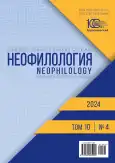Epithetization as a way of categorizing football discourse
- Authors: Chernikova N.V.1
-
Affiliations:
- Michurinsk State Agrarian University
- Issue: Vol 10, No 4 (2024)
- Pages: 779-788
- Section: RUSSIAN LANGUAGE. LANGUAGES OF PEOPLES OF RUSSIA
- URL: https://journal-vniispk.ru/2587-6953/article/view/295618
- DOI: https://doi.org/10.20310/2587-6953-2024-10-4-779-788
- ID: 295618
Cite item
Full Text
Abstract
INTRODUCTION. The relevance of the study is due to the need to study the linguistic methods of categorization of socially significant fragments of the external world and different types of discourse. The purpose of the study is to identify epithets characterizing the game of the Russian national team and its rivals at the 2018 FIFA World Cup; to determine the composition of their thematic groups and subgroups, as well as linguistic means that are carriers of the characteristic nomination, in the process of lexical, grammatical and functional categorization of linguistic units.MATERIALS AND METHODS. The subject of the study is a feature nomination (epithetation) as a way of categorizing sports (football) discourse based on the material of the journalistic book by the Russian sports journalist I.Ya. Rabiner “Team-2018: Champions of Our Hearts”. During the analysis of the linguistic material, the method of continuous sampling, contextual analysis, the method of semantic-cognitive analysis, the modeling method, and the statistical method are used.RESULTS AND DISCUSSION. In the process of lexical and functional categorization of characteristic words (epithets), two thematic groups were identified: 1) epithets characterizing the game of the Russian national team; 2) epithets characterizing the game of the opponent. Each group is represented by several subgroups. Cases of interaction of epithetization and metaphorization were revealed, demonstrating the transition from one conceptual area to another (crazy blow, aggressive football, iron penalty). In the process of grammatical categorization of epithets, means of expressing the characteristic nomination (adjectival and adverbial vocabulary) and 8 structural models of epithet complexes were determined.CONCLUSION. According to statistics, the number of epithets characterizing the play of the Russian national team is 5 times greater than the number of epithets characterizing the play of the opponent; the number of subgroups of the first thematic group is almost 2 times greater than the number of subgroups of the second thematic group. Such quantitative indicators reveal the ethnocultural and personal features of the linguistic understanding of a fragment of the world and emphasize attention, special interest in national (Russian) realities. Many epithets characterizing the play of the Russian national team have a positive connotation (wonderful attack, united, integral, brotherly play, excellent defender), in contrast to epithets with a negative connotation characterizing the play of the opponent (terrible, panicky play, empty, slow and clumsy players).
About the authors
N. V. Chernikova
Michurinsk State Agrarian University
Author for correspondence.
Email: chernikovanat@mail.ru
ORCID iD: 0000-0003-1572-2316
Dr. Sci. (Philology), Associate Professor, Professor of Social and Humanitarian Disciplines Department
101 Internationalnaya St., Michurinsk, 393760, Tambov region, Russian FederationReferences
- Boldyrev N.N. Kognitivnaya semantika. Vvedenie v kognitivnuyu lingvistiku. Tambov, Publishing House of Derzhavin Tambov State University, 2021, 236 p. (In Russ.) https://elibrary.ru/fsskuz
- Boldyrev N.N. Language and the System of Knowledge. A Cognitive Theory of Language. Moscow, Languages of Slavic Сultures Publ., 2019, 480 p. (In Russ.) https://elibrary.ru/oxliyg
- Slyshkin G.G. Lingvokul’turnye kontsepty i metakontsepty. Volgograd, Peremena Publ., 2004, 340 p. (In Russ.) https://elibrary.ru/qrpaav
- Gizatullin D.E. General scientific and philosophical aspects of the term “category” in linguistics. Filologicheskie nauki. Voprosy teorii i praktiki = Philology. Theory & Practice, 2017, no. 12-2 (78), pp. 90-93. (In Russ.) https://elibrary.ru/zrqxgr
- Karasik V.I., Kitanina E.A. Symbolization of desert in linguistic consciousness. Voprosy kognitivnoi lingvistiki = Issues of Cognitive Linguistics, 2024, no. 1, pp. 29-37. (In Russ.) https://doi.org/10.20916/1812-3228-2024-1-29-37, https://elibrary.ru/hjuuzf
- Mikeshina L.A. Epistemology and Russian sociology: their interaction in the development. Sotsiologicheskie issledovaniya = Sociological Studies, 2019, no. 9, pp. 19-27. (In Russ.) https://doi.org/10.31857/S013216250006662-1, https://elibrary.ru/wcmxrz
- Gubanov S.A. Epithetization of love in m. Tsvetaeva’s texts. Neofilologiya = Neophilology, 2024, no. 10 (2), pp. 326-333. (In Russ.) https://doi.org/10.20310/2587-6953-2024-10-2-326-333, https://elibrary.ru/fzqqew
- Gubanov S.A. The problem of defining an epithet. Na peresechenii yazykov i kul’tur. Aktual’nye voprosy guma-nitarnogo znaniya, 2020, no. 3 (18), pp. 98-103. (In Russ.) https://elibrary.ru/pwihde
- Bulakhova N.P., Skovorodnikov A.P. Concerning the definition of epithet (preparation to the functional charac-teristic). Ekologiya yazyka i kommunikativnaya praktika = Ecology of Language and Communicative Practice, 2017, no. 2 (9), pp. 122-143. (In Russ.) https://elibrary.ru/yusmrd
- Lakoff J., Johnson M. Metaphors We Live By. Moscow, Editorial URSS Publ., 2004, 256 p. (In Russ.)
- Baranov A.P. Deskriptornaya teoriya metafory. Moscow, Languages of Slavic Сultures Publ., 2014, 632 p. (In Russ.) https://elibrary.ru/vrrywx
- Vorkachev S.G. V chashche simvolov: obraz v yazyke i kul’ture. Krasnodar, Kuban State Technological Univer-sity Publ., 2021, 264 p. (In Russ.) https://elibrary.ru/cahdya
- Budaev E.V., Chudinov A.P. Discursive turn in contemporary political metaphorology. Kognitivnye issledova-niya yazyka = Cognitive Studies of Language, 2019, no. 36, pp. 53-60. (In Russ.) https://elibrary.ru/yzztkx
- Budaev E.V., Chudinov A.P. Contemporary Russian political metaphorology (2011–2020). Filologicheskii klass = Philological Class, 2020, vol. 25, no. 2, pp. 103-113. (In Russ.) https://doi.org/10.26170/FK20-02-09, https://elibrary.ru/cstmyx
- Fedoseeva D.A. Cognitive theory of metaphor and the imbodyment approach to cognition (review). Metod = Method, 2017, no. 7, pp. 306-314. (In Russ.) https://elibrary.ru/zuqlzr
- Chernikova N.V., Rasskazov N.Yu. Metaphorical models of the thematic sphere “football” (on the material of the book by I.Ya. Rabiner Team-2018: Champions of Our Hearts). Nauka i obrazovanie, 2021, vol. 4, no. 2. (In Russ.) https://elibrary.ru/usicej
Supplementary files









